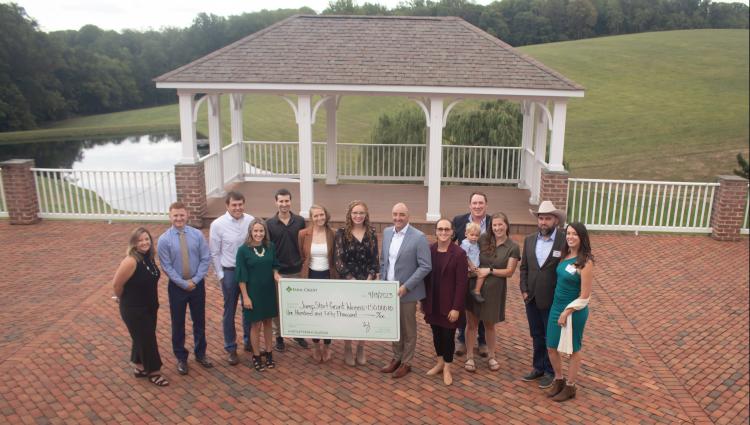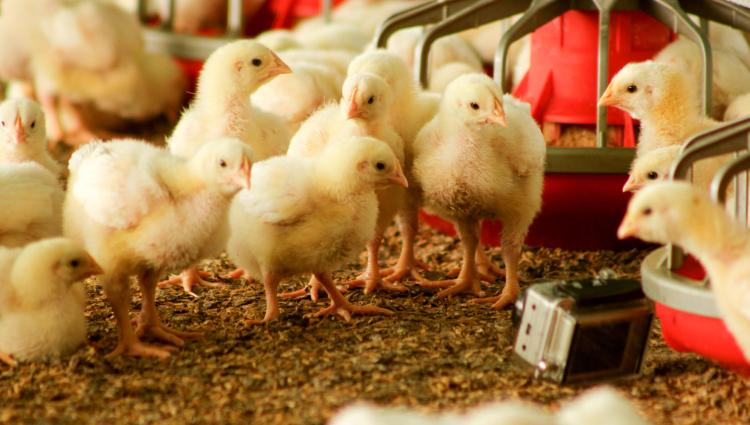Newsroom
Horizon Farm Credit Announces 2023 Third Quarter Financial Results
Horizon Farm Credit has announced its 2023 third quarter financial results. Net accruing loan volume for the first nine months of 2023 was $6.4 billion, an increase of 9.3 percent compared to the same 2022 period. Net interest income for the third quarter of 2023 was $42.3 million, a 1.2 percent decrease from the same time period in 2022. Net income for the quarter was $29.2 million, a 15.9 percent decrease compared to the third quarter of 2022. The unfavorable impact of the 2023 third quarter results is principally related to a provision for allowance for credit losses recorded and increased operating expenses in the third quarter of 2023.
Nonaccrual loans decreased $1.7 million in the third quarter of 2023 to $30.8 million, compared to $32.5 million at December 31, 2022, and decreased $4.9 million compared to $35.7 million at September 30, 2022. The Association’s nonaccrual loans as a percentage of total loans decreased to 0.48 percent at the end of the third quarter of 2023 compared to 0.54 percent at the end of 2022, and 0.60 percent at the end of the third quarter of 2022.
“We continue to be pleased by our Association’s financial performance and hold a highly positive outlook, as we approach year-end,” said Tom Truitt, Chief Executive Officer. “Our Board of Directors and management team remains committed to ensuring that our cooperative is well positioned to serve the present and future needs of agriculture and rural communities,” he continued. “The sustained strong performance of our Association enables us to fulfill that important mission.”
Members’ equity at September 30, 2023 totaled $1.2 billion, up 4.0 percent from December 31, 2022. Total Capital Ratio was 16.21 percent as compared with the 10.5 percent minimum mandated by the Farm Credit Administration (FCA), the Association’s independent regulator. The Association paid a cash patronage distribution of $91 million to its member-borrowers in the first quarter of 2023.
Please enter a valid password to access this page:
Wrong password. Try again!Newsroom
Farm Credit Announces 2024 Ag Biz Masters Educational Program Registration
Farm Credit has announced that registration for Ag Biz Masters, the nationally recognized learning series for young and beginning farmers, is open now through December 15, 2023.
“Farmers are, by nature, lifelong learners,” says Tom Truitt, CEO of Horizon Farm Credit. “We’re pleased to support agricultural producers, not only with financing, grants, and awards, but also through educational opportunities, including our Ag Biz Masters program, which will benefit those seeking to break into the industry or expand their business knowledge.”
The two-year educational program is available to young, beginning, and small producers who are interested in refining their business management, financial, and marketing skills to help them as they launch or grow their businesses.
Ag Biz Masters blends virtual live and on-demand learning. The year one curriculum focuses on trends in agriculture, strategic business planning, financial management, and constructing both a balance sheet and income statement. Year two includes learning modules centered on understanding lending decisions, growth and transition management, personal financial management, and leadership skills.
“To date, we’ve had 730 students graduate from our Ag Biz Masters program,” says Johanna Rohrer, Horizon Farm Credit’s Member Education and YBS Program Manager. “Agriculture is a constantly changing industry, and we encourage all producers to take advantage of this opportunity to develop their business skills, just as they continue to advance their farming practices.”
The next Ag Biz Masters class begins in January 2024 and will run through April. The registration fee is $225, with full reimbursement available to those who successfully complete their registered year and live within the Horizon Farm Credit service area.
For more information about the Ag Biz Masters educational program, please visit agbizmasters.com, or contact Johanna Rohrer at 888.339.3334 or learning@horizonfc.com.
Please enter a valid password to access this page:
Wrong password. Try again!With the weather being unpredictable, we want to keep you informed of any changes
Newsroom
Biologicals: What They Are and Their Impact on Agriculture

Joe Waddell, Director of Market Innovation, Horizon Farm Credit
What are biologicals in agriculture?
Biologicals, in an agricultural context, are products that are derived from living organisms to enhance crop growth, soil health and pest control. When discussing soil biologicals, we are taking precision agriculture to the next level by getting out the microscopes and delving into the makeup of the soil profile itself.
Is farming with biologicals a new concept?
While agricultural biologicals is not necessarily a new topic, it has seen renewed interest as U.S. farmers continue to push efficiency barriers across the ag landscape. This pursuit has led many to seek a better understanding of the relationships between the microbial activity in the soil profile and the plants growing within it. The biological space is beginning to open another door of opportunity, as they have the potential to drive efficiency, reduce use of synthetic chemistry and fertilizer, while also maintaining healthy soil profile and contributing to long term sustainability.
The data surrounding biologicals in agriculture
Data and field trials around agricultural biologicals have historically been hard to compile due to the living nature of the subject matter. Microorganisms can be easily affected by the climate around them. Too warm and they don’t survive well; too cold and they go dormant. The application window can be key to the success or failure of the selected treatment.
Historically there hasn’t been very robust data science backing up this space, but with the renewed interest and large number of investments being made, and some of the larger crop sciences companies investing in biologicals by dedicating a portfolio position to them, the data analytics side is starting to show some life. Some recent announcements include the newly formed Mosaic Biosciences which will be dedicated to bringing biological technologies to market, Syngenta Biologicals which brings together Valagro and its in-house biologicals business, and Corteva’s acquisition of Symborg and Stoller to bolster its position in the space. Agriculture biologicals are beginning to cement themselves as a core business area going forward. Several other independent companies have been making a name for themselves in the space as well. A couple to note would be: Pivot Bio with its nitrogen-fixing bacteria, and Sound with its flagship product SOURCE which works with the plants to “awaken the soil microbes” utilizing nutrients in the soil profile that aren’t readily available to the plants.
Farming biologicals and sustainability
With the excitement around biologicals in agriculture, there has been a bit of frenzy to enter the space. The discussion around sustainability may be one reason the market has gained traction over the past few years. While the synthetic portion of crop protection is heavily regulated, the biological space has a lower barrier to entry. Currently, no proof of efficacy is required, which presents both opportunities and challenges. The number of products available and the claimed benefits may make it difficult for farmers to sort through and evaluate the options and consider what effect the products may have on the broader ecosystem. As with any innovative product, there is risk associated with their use.
Getting started with agricultural biologicals
The key to successfully navigating this space is to have a have a broad understanding of soil heath profiles on one’s own farm. Obtaining and understanding base measurements are key. Those who do not have a true understanding of their soil’s current condition cannot accurately assess the benefit of any practice or product being added to the system.
Having access to better soil nutrient profile tests, including soil biologics, would significantly improve the understanding of this space. When looking at soil test results, it is important to understand the details. For example, nutrient stratification is often overlooked when assessing current soil health. There is work being done with companies like Biome Makers who are working to build out a database of microorganisms through proprietary DNA sequencing. They have built out a suite of tools to help trace biologics in the soil profile with, BECROP test, BECROP trials, and BECROP Rate.
Summary
Synthetic chemistry and fertilizers are not going away any time soon. They are the current standard that has helped pave the way for the efficiency that the U.S. ag market has been able to achieve. A door is opening, however, for the partnership between synthetics and biologicals to work hand-in-hand. Together, they could take agronomic efficiency to the next level while also producing long-term sustainability. Knowledge of how biologicals are used for farming is important to understanding the larger agronomic picture. Careful consideration of how they affect the whole ecosystem, not just the area of focus, is essential. Further due diligence is needed to really understand the overall impact this space will have on agriculture the in the coming years. Long-term field trials with third party verification will be key to defining the efficacy of biologicals.
We’ll be keeping an eye on the science of agricultural biologicals and will provide updates as more is discovered. In the meantime, if you have any questions or want to talk shop, please feel free to reach out to me: jwaddell@horizonfc.com, 814.573.8341, Joe Waddell | LinkedIn
Please enter a valid password to access this page:
Wrong password. Try again!Newsroom
Farm Credit Announces Recipients of JumpStart Grant Funding

Farm Credit recently announced a $150,000 disbursement of grant funds to beginning farmers through JumpStart, the Association’s competitive grant program for farmers in the start-up phase of business. The following applicants were selected to receive $10,000 each to establish and grow their farms:
- Paul & Laura Congleton from Woodbine, MD
- Carlene Curtis from Parkton, MD
- Eric & Christy Donnelly from Rocky Ridge, MD
- Benjamin & Sarah Goldberg from Clarksville, MD
- Jon Hartzler & Erin Luley from Pennsylvania Furnace, PA
- Lulav Lieberman from Newark, DE
- Matthew & Brittany Miller from York Haven, PA
- John Orlowski from Knoxville, MD
- Andrew Porter & Rebecca Robertson from Spring Mills, PA
- Matthew & Jessica Schnupp from Harrisburg, PA
- Richard Talbott from Gerrardstown, WV
- Katelynn Troy from Parkton, MD
- Timothy & Edna Yoder from Salisbury, PA
- Titus & Anna Yoder from Salisbury, PA
- Blake & Sarah Ziegler from Lebanon, PA
More than 100 applications were received for the 2023 JumpStart grant program, all of which were carefully evaluated by a diverse panel of agriculture professionals and industry experts. Those named above were selected on the merits of their submissions, which included an application, business plan, and completion of the Ag Biz Basics educational course.
“Beginning farmers are the future of our industry,” said Tom Truitt, Chief Executive Officer of Horizon Farm Credit. “We are pleased to offer JumpStart grants as part of the Association’s ongoing support of producers who are just starting out and establishing their operations,” he says. “The funding provided by this grant program goes a long way toward helping these new farmers pursue their dreams and realize long-term financial success.”
JumpStart is an annual grant program for agriculturalists who are at least 18 years of age, have two years or less of farming experience or be planning to begin farming within the next two years, and reside in Horizon Farm Credit’s territory and Washington, D.C. The program is open to both full and part-time farmers and does not require applicants to be Farm Credit customers. Learn more about this program by visiting horizonfc.com/jumpstart.
Please enter a valid password to access this page:
Wrong password. Try again!Newsroom
Farm Credit to Host Poultry Industry Seminar

Farm Credit has opened reservations for its third annual Delmarva Poultry Seminar, which is scheduled for October 3, 2023 in Salisbury, Maryland.
The event will take place at the Wicomico Youth and Civic Center from 9am through 3:30 p.m. and will feature presentations from industry experts in the areas of production and animal care, biosecurity, and the implementation of solar processes. Lunch will be provided. The seminar will deliver both educational and networking opportunities; nutrient management credits will also be available. Additional information can be found at horizonfc.com/seminar.
The Poultry Seminar is free and open to all interested poultry growers but reservations are required. Please RSVP at horizonfc.com/seminar no later than September 19, 2023. Questions should be directed to 888.339.3334.
Please enter a valid password to access this page:
Wrong password. Try again!Newsroom
Farm Credit Announces Launch of the 2023 Farmers on the Rise Award Program
Farm Credit announced the launch of its third annual Farmers on the Rise program, which awards up to ten beginning farmers in its footprint with $10,000 to grow their operations.
“This award program was created to recognize outstanding farm owner-operators within the diverse agricultural community and help them to expand their existing agricultural business,” says Tom Truitt, CEO of Horizon Farm Credit. “Those selected to receive an award will be recognized based on their efforts in agriculture, financial character, leadership, community involvement, and environmental stewardship.”
The award program is open to beginning farmers in Horizon Farm Credit’s footprint who have at least three years of experience, but no more than ten years of farming experience.
In 2022, Farm Credit selected ten applicants to receive Farmers on the Rise award funding. “Last year’s applicants were truly all impressive. Their businesses ranged from livestock and grain to agritourism and CSAs” says Johanna Rohrer, Member Education & YBS Program Manager at Horizon Farm Credit. “Our panel of judges is, once again, looking forward to reviewing the applications this year and seeing the inspiring dreams of our region’s producers.”
This program is open to all farmers meeting the experience threshold and geographic requirements outlined above. Applicants are not required to be Farm Credit customers, although current customers are encouraged to apply. The deadline to submit an application is October 6, 2023 at 4PM. For more information and to apply, visit horizonfc.com/rise. Questions about this program or application should be directed to learning@horizonfc.com.
Please enter a valid password to access this page:
Wrong password. Try again!Newsroom
Social Security Benefits

When we talk about social security benefits, the subject is often met with a lot of negative thoughts. Generally, most people don’t look it as much of a benefit for retirement and many don’t believe it will even be there when they reach retirement age.
The truth is, we have been talking about making changes to the social security system for decades, but no major changes have happened yet. If and when our security system is overhauled, it will have to be done gradually, with older taxpayers grandfathered into the system.
While it is true that we cannot count on social security to cover our living expenses in retirement, for most of us it still will provide the basis for our income in our senior years. Here are a few things we should keep in mind as we plan and build for our retirement years.
How do you qualify for social security?
To qualify for social security, an individual needs 40 credits of earnings. A person’s benefit is determined by their top 35 earning years adjusted for inflation. In 2022, an individual needed to earn $1,510 to receive one credit with a maximum of four per year. In other words, to qualify, a person needs 10 years of work.
It’s important to note that special rules apply to self-employed farmers. If a farmer does not earn enough for the year to receive his four credits, the farmer can take the optional social security method, pay the resulting self-employment tax, and get credits for that year. This step is very important for farmers to make sure they get their 10 years of earnings in. When we are young, we don’t really think about our mortality and our retirement years. However, social security benefits are there in case one becomes disabled or, in case of death, would provide survivor benefits for our children. This makes it essential we build that history as soon as possible.
What is full retirement age?
Full retirement age for those born in 1960 or later is 67. For those born between 1943-1960, the age gradually increases from 65 to 67.
How does early retirement effect social security benefits?
A person can start receiving retirement at age 62, but there will be a decrease in monthly benefits until they reach full retirement age. The monthly benefit you start with will be your monthly benefit forever, only changing with increases for inflation. For the person taking social security at age 62, the reduction is about 30% from the amount they would receive at full retirement. Additionally, there is an annual limit on earnings until a person reaches their full retirement age. This year (2023) 2023, the limit is $21,240. Social security will deduct $1 for every $2 dollars earned above that amount. Before taking social security early, these considerations need to be taken into account.
How does delaying benefits effect social security benefits?
On the other side of this, a person can always delay taking their benefits until age 70. A person’s monthly benefit will increase about 8% a year until they reach age 70. After age 70, this will not change, nor will delaying it raise the monthly payment. Consequently, there is no reason to delay taking benefits after age 70.
What do these benefits mean for spouses?
A spouse receives one half of the retired workers’ benefit at full retirement age. If an individual has both benefits from their spouse as well their own, the individual always gets their own first. The individual may receive more if the spouse’s benefit is higher. In the event of the death of an individual, the surviving spouse then receives the benefit that is highest.
Are social security benefits taxed?
Up to 85% of social security benefits are taxable, depending on other income. For a taxpayer that is filing married, if their other income is over $44,000, they could pay tax on up to 85% of their social security income.
In summary, the decision of when to start receiving social security is one that should not be taken lightly. Everyone’s financial situation and life expectancy is different, so it not a one size fits all decision. The first step is to check out your earnings and projected social security income at: ssa.gov/myaccount. This website replaces the yearly benefit letter that we all used to receive. This will help you start the retirement process. It is always a good idea to consult a retirement specialist or consultant to help you through this process.
Please enter a valid password to access this page:
Wrong password. Try again!Unfortunately, scammers and fraud attempts have become harder and harder to detect. Scammers (also known as “bad actors”) trying to commit fraud are becoming more of a common occurrence and something you need to be aware of as you work with us and others throughout the loan process. So, you’re probably wondering - how exactly do I identify a fraud attempt, safeguard my information and what does Farm Credit do to protect me?